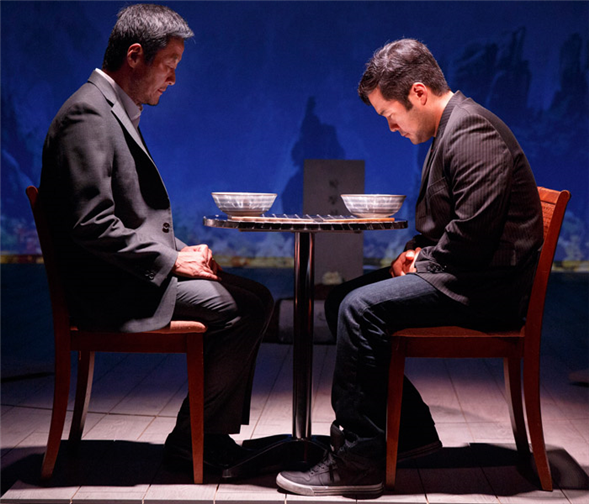Translate Page

In Aubergine, grief is not the end of the story
---
A man dies in Aubergine, the Julia Cho play that's now at Playwrights Horizons. Before he goes, his illness (terminal) compels his son (estranged) to come home, talk to a hospice worker, hold a bedside vigil. His impending death also forces his son to call an old girlfriend (estranged), since she speaks enough Korean to let the dying man's brother (estranged) know what's about to happen.
By the time the man passes, the people around him aren't so estranged. Things inside them shift, and they move closer together. Things outside them shift as well, so that time and space behave differently. One room flows into another. Hours pass in a blink. People understand each other's private thoughts with an almost magical clarity.
Director Kate Whoriskey wants her production to honor these changes. That's why, for instance, the set design hovers just above "reality," with walls and furniture that slide on invisible tracks or rise gently from under the floor. "We were trying to find a space that felt slightly minimal and slightly abstracted, but also had enough realism so people were grounded in the reality of this taking place in a home," she says. "You want the audience to know where they are, but you don't want them to come in and think, 'Oh, I'm in a realistic setting and it will be a naturalistic play.' You have to tip the design so it feels like you're going to be listening in a different way."
{Image1}
In other words, when time and space get fluid, Whoriskey wants us to accept it. Otherwise, we might not embrace the play's conclusion. "Often, once a character dies, then it's like, 'Okay, now we wrap it up,'" she says. "But to me this play is about death and the grieving process. It's about both things. It was important for me, once the father dies, to find a way to move seamlessly through those scenes of grieving."
When the final moments work, everyone in the room can sense it. "People seem to bring more of their personal history to this play than they might to some other plays," Whoriskey says. "In some performances, it just feels like there are many people who have lost people, and there is some kind of community that forms in the audience around that loss. I was very surprised by that, and I was very affected by it."
---
Follow Stages editor Mark Blankenship at @IAmBlankenship. Follow TDF at @TDFNYC.
Photos by Joan Marcus. Top photo: Stephen Park (left) and Tim Kang
TDF Members: Go here to browse our latest discounts for theatre, dance, and concerts.